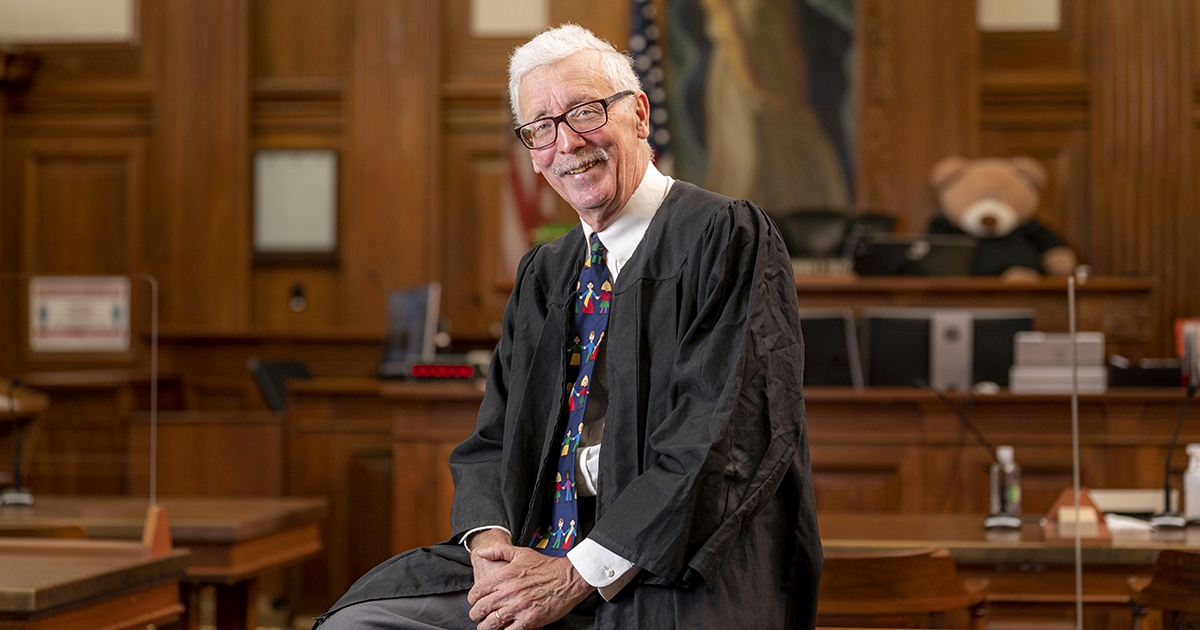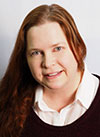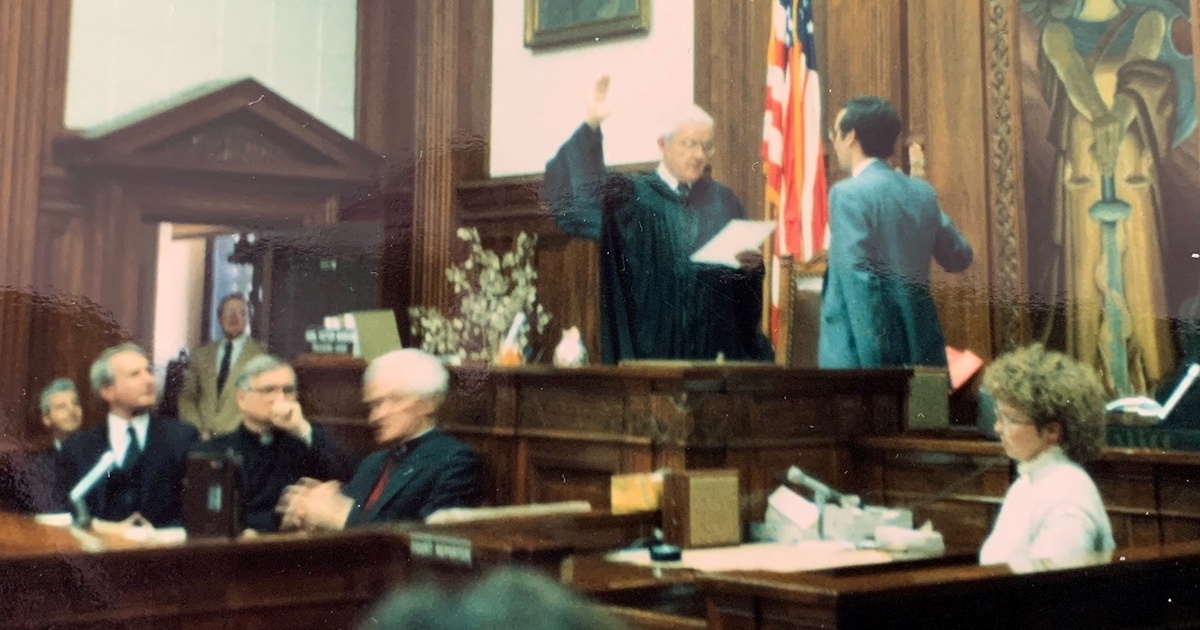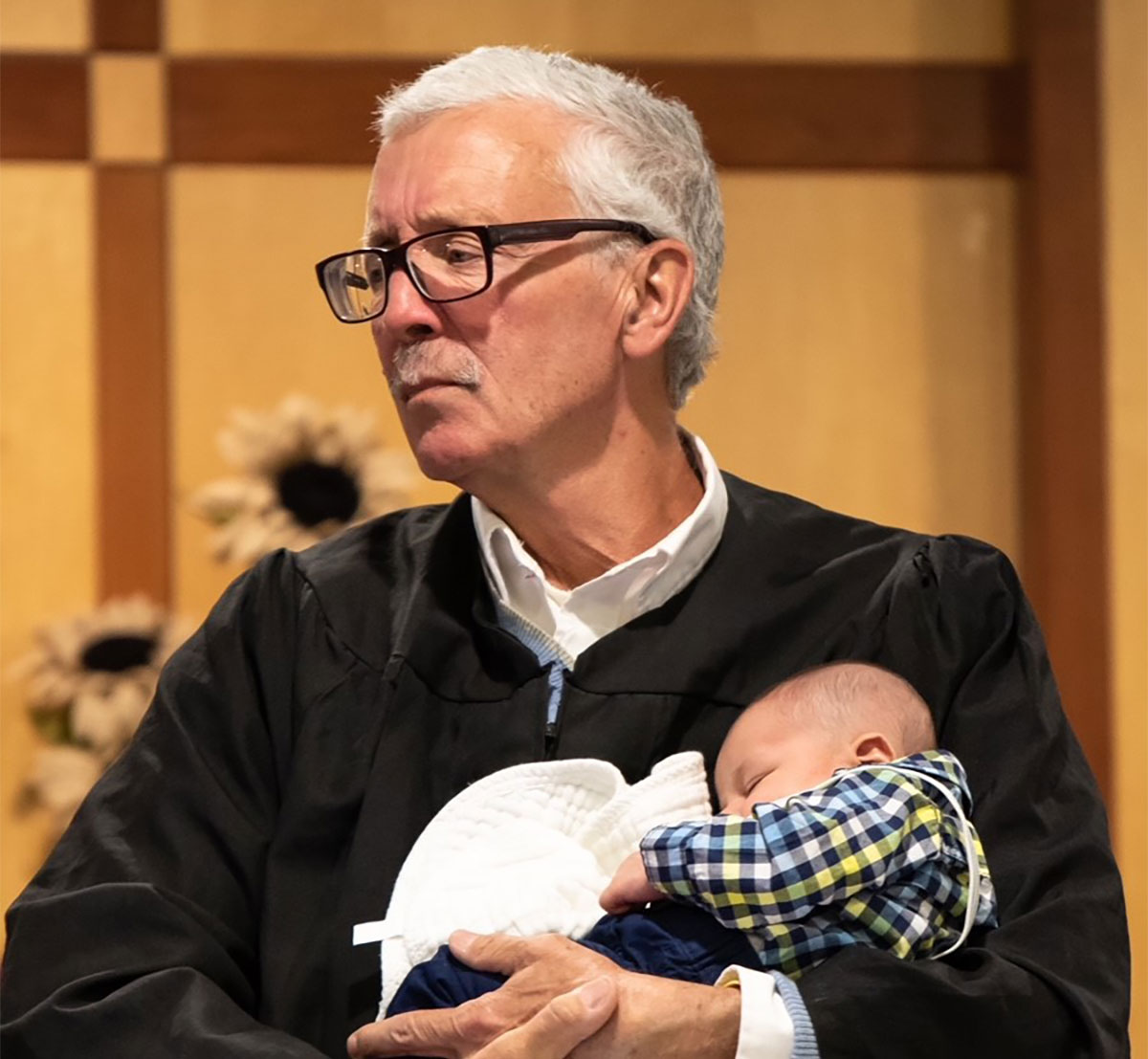
Judge Christopher Foley keeps a teddy bear on the bench in his courtroom in Milwaukee County Circuit Court. “Judge Bear” (with a gavel and robe) was part of an award from the Jockey Being Family Foundation that supports adoption, honoring the judge for his adoption work. At adoptions, “the kids just love the bear,” Judge Foley says. “But I do have to explain it during civil trials,” he added with a laugh. Photo: Andy Manis.
June 15, 2022 – He is described as a rare judge, passionate about the law, and especially about helping the children who end up in his courtroom.
Judge Christopher Foley, Milwaukee County Circuit Court, is the recipient of the 2022 Lifetime Jurist award from the State Bar of Wisconsin.
The award, from the State Bar Bench and Bar Committee, recognizes jurists who, during their tenure on the bench, are fair and impartial, demonstrate high ideals and personal character, and demonstrate outstanding, long-term judicial service.
Judge Foley said he is “surprised, humbled, and grateful” to receive the award. “There’s something special when your professional colleagues say job well done.”
The State Bar celebrates this award and others annually at the Member Recognition Celebration (MRC), part of the
State Bar's Annual Meeting & Conference this week. The 2022 MRC event is Thursday, June 16, 2022, at the Grand Geneva Resort & Spa in Lake Geneva.
Judge Foley is indeed a “once in a lifetime judge,” say those who nominated him.
“To find a judge like this is rare. They are truly passionate about the law and those they serve. They also reach a level of excellence beyond comparison with their colleagues,” said Judge Mary Triggiano and Judge Carl Ashley, two of several who nominated Judge Foley for the award. “We think it has to do with how they stay true to their core values, justice, and service.”
‘He Stands Next to His Father as an Equal’ – Comm. Kevin Costello, Waukesha County
Judge Foley is a graduate of Marquette High School, received an undergraduate degree in political science from Marquette University, and in 1978, earned his J.D. from the Marquette University Law School.
 Shannon Green is communications writer for the State Bar of Wisconsin, Madison. She can be reached by
email or by phone at (608) 250-6135.
Shannon Green is communications writer for the State Bar of Wisconsin, Madison. She can be reached by
email or by phone at (608) 250-6135.
A Milwaukee native, Judge Foley said he knew he wanted a career in law “as long as I can remember.”
He is the son of renowned Judge Leander J. Foley Jr., a 1948 Marquette law graduate – who served 26 years on the Milwaukee Circuit Court bench – from 1959 to 1985.
“My dad was a remarkable guy – a wonderful guy,” Judge Foley said. “If you think he was a great judge, you should’ve known him as a dad.”
Judge Foley’s own path to the Milwaukee County bench involved time as a law clerk to Wisconsin Court of Appeals Judge John Decker, and nearly four years as a Milwaukee County assistant district attorney. From 1983 to 1985, he served as municipal judge for the City of Milwaukee.
Then came Christmas Eve, 1985.
“It was remarkable. I still get choked up about it,” Judge Foley said.
His father had announced his retirement at the end of the year. “The magical piece of how this happened was the Governor’s Office made the decision on Christmas Eve.”
In simultaneous phone calls that day, Gov. Tony Earl called his father, and the governor’s legal counsel called Judge Foley – informing both that Christopher Foley was appointed to the bench being vacated by his father.
“When I hung up, my father said ‘you won’t believe who I just talked to,’” Judge Foley said. “I said, ‘I know, Dad.’ He was elated. I was over the moon!”
“It was a very special moment for my dad and me.” And before New Year’s Day 1986, Christopher Foley was sworn in as judge by his father.
“If you’re going to be the person to replace a remarkable judge – the best way to do it is to be raised by one,” Judge Foley said. “To the extent I’ve been a good judge – it’s because I was raised by my dad and my mom. My parents and my wife, Deb, are the most selfless people I know.”
Judge Leander Foley went on to become a “much sought-after mediator,” and was
honored in other ways.
Judge Foley took the Milwaukee Circuit Court bench at age 32. “That may have been too young, in retrospect,” he said. “I don’t regret it – and there was a confluence of events that made it the time – but I think with more years of practice, I would have been more prepared.”
Since his appointment at the end of 1985, he’s been elected and reelected, unopposed, seven times. His duties run between the civil division and children’s courts – although his heart is invested with the children.
He’s now known as a national expert on juvenile law, especially in CHIPS proceedings and termination of parental rights cases.
“I love the civil division for the intellectual challenge it presents. Children and law has always been one of my passions,” he said. “It is my belief that it’s
this court where we can most directly impact the lives of children and families in a positive way, although sadly that doesn’t always happen. When it does happen, it is so remarkably rewarding.”

Christopher Foley is sworn in by his father, Judge Leander Foley, in December 1985. Christopher Foley immediately succeeded his father in the same branch in Milwaukee County Circuit Court. Photo: submitted.
Suing a Governor
Judge Foley offers this bit of advice: “If you’re interested in climbing the judicial ladder, don’t sue the governor – and win.”
The case: Joni B. v. State of Wisconsin from 1996.1 When legislation was passed barring the court from appointing attorneys for parents after the Public Defender's Office was relieved of their required representation for indigent parents, Judge Foley and six other judges became petitioners, suing the state of Wisconsin in an effort to ensure parents had a right to counsel in cases where the state brought suit against parents.
The Wisconsin Supreme Court resolved the case in favor of Judge Foley's position that there was a violation of the Wisconsin doctrine of separation of powers and the Due Process Clause of the U.S. Constitution. Because of this case, counties have provided attorneys to indigent parents, thus securing their fundamental rights in court and to raise their children without undue interference from the government.
“What the Legislature did – I was very angry,” he said. “It was wrong, and I think part of my anger was that we had told them it was unconstitutional. So we sued the governor (Tommy Thompson). I was not going to let them do that to parents and their children.”
In addition, Judge Foley is an important judicial educator. He is known for his “willingness to share his wealth of knowledge with his colleagues whenever called upon, both individually and through his numerous presentations at judicial trainings. He is considered an expert in children's court issues and he is always willing to share with his colleagues and others,” say nominators Judge Triggiano and Judge Ashley.
Thoughts on CHIPS Cases
“I say this all the time: the issue in child welfare cases is very seldom whether there is a problem. The issues are how are we going to fix this problem. If we can’t fix this problem, how will we resolve that irresolvable situation for those children?” he said. “It’s always been my frustration of the legal dance pretending there wasn’t a problem.”
The purpose, Judge Foley says, is to resolve the safety issues and get children home timely and safely. In 2003, he led a group to tighten timelines on CHIPS cases, allowing a focus on the actual issues and giving families the chance to reunite without having the legal system get in the way. “I was passionate about that then – I still am.”
Say nominators Judge Triggiano and Judge Ashley: “The bench is where Judge Foley uses his practical wisdom to analyze the tangled problems presented to him, understand the human conditions that produced them, hear and respect the arguments of counsel, and make those everyday decisions – some simple, but many not so simple, concerning many of life's most difficult problems. His practical wisdom earned him the admiration of his colleagues and provided the foundation for his reputation as a jurist.”

Judge Christopher Foley holds baby Noah during his adoption proceeding in 2019. Adoptions are the "magical" part of his job, says Judge Foley. Photo: submitted.
Coloring Outside the Lines
The magical part of being a judge: “Adoptions.”
“When it comes time to grant the petition,” said Judge Foley, “if the child is old enough, I bring the child up to the bench.” The child gets to bang the gavel, announce that the petition for adoption is granted, and announce their new name. “That makes a magical day even more magical.”
These relationships that begin in the courtroom provide long-lasting rewards.
Judge Foley recalls when the sister of an adopted child came up to his bench and banged the gavel to grant the petition. Neary 15 years later, the judge received a phone call from the girl’s mother. The girl, now grown, had just graduated from law school. He was invited to her graduation party. “All those years later, and she remembered me. I was just so touched to be contacted and attend her party,” Judge Foley said.
One year, Judge Foley invited a 12-year-old boy whose adoption fell through to spend time during the summer with the judge and his family at their vacation home in Eagle River. “He’s now adopted and doing well.”
“I think judges need to understand that we have an ability to impact lives in a positive way. You must stay within the bounds of ethics, but when you can impact a life with a personal connection, it can be phenomenal – the impact you can have. I know other judges don’t find that comfortable,” he said.
You can see one adoption from 2016, when a little girl named Abby was so excited to be adopted that she invited her schoolmates to the hearing.
See the video on ABC News.
“She had been begging the school staff to use her adoptive last name, which was not possible until she was officially adopted. So when we did the hearing, the local news attended, and it ended up on
Good Morning America.” You can see Judge Foley with Abby in his chair when she takes up the gavel. “She turned and looked at her mother and her eyes were so bright,” he said.
There was no question of not allowing the news team and the class inside the hearing.
“That’s me,” he admits, “coloring outside the lines. Me, and my wife and family – we have all embraced these children. It isn’t all seashells and balloons, however – I have spoken at the funerals of children who were in my heart. You take that risk, too.”
“We have an incredible opportunity to impact lives. When you do and when it’s good, it doesn’t get better than that,” he said.
Casual Ties
Other things he’s known for: attire that is more casual than court appropriate. “I’m a bike commuter,” Judge Foley said. “I tell folks that I’m the nicest, smartest, best-looking, and worst-dressed. And the only true part of that is the worst dresser part,” he jokes. “I’ve gotten disbelieving looks from clients when their attorneys point out that I’m the judge.”
But the bike commuting is important for work-life balance. “There’s a method to that madness. It’s not just transportation.” It’s also a way to get rid of the stresses of the courtroom before going home. “I was going home to seven young kids (they are now grown) who needed my attention and energy. So, it’s a release, and when I don’t ride, I can sense it from an emotional standpoint.”
35 Years and Counting
Judge Foley “is truly a judge's judge who has consistently mentored new judges and lawyers for decades. His impact on the law will be felt for generations,” said Judge Joseph Donald, Wisconsin Court of Appeals District 1.
And after 35 years on the bench, he has no plans for retirement: Judge Foley was just reelected for another six-year term ending in 2028.
“I love what I do. I think I’m still good at it,” he said. “Everyone tells you that you’ll know when it’s time. I’m waiting to be told,” he added with a laugh.
Join in the Celebration at the Annual Meeting & Conference in June in Lake Geneva
Judge Foley receives his award at the Member Recognition Celebration at the Grand Geneva Resort in Lake Geneva.
Join the celebration at 5:30 p.m. on Thursday, June 16, 2022. The celebration takes place at the
State Bar Annual Meeting & Conference. Conference registration is not required to attend.
Endnotes
1Joni B. v. State of Wisconsin, 202 Wis.2d 1.549 N.W. 2d 411 (1996).
